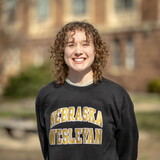In August, Nebraska Wesleyan University student Alex Ulmer wrote about his stereotype of a homeless person.
Uneducated…not willing to find work…lazy were just a few words that came to mind.
“I now see homeless people in an entirely different light,” said Ulmer, a junior from Elmwood. “They’re simply people who, unfortunately, have encountered difficulties beyond their control.”
Ulmer and 18 of his classmates enrolled in Professor Rachel Droogsma’s gender communication course were assigned a project that not only helped them learn communication theories and gender dynamics but put those concepts to practice through a service learning project.
“Service learning brings course concepts alive,” said Droogsma. “They are not learning in a box.”
Droogsma’s gender communication class explored the topic of homelessness, quickly discovering the variety of gender differences that relate to socioeconomic class. In addition to their communication textbook, students were assigned readings on homelessness.
Students were challenged to “get their feet wet” with service learning. Some volunteered with Project Homeless Connect, a one-day one-stop event for homeless individuals and families to receive a variety of services. Some students volunteered in a soup kitchen.
Then Monica Zinke, executive director of Fresh Start, a transitional home for women, spoke to the class. She talked about Lincoln’s alarming homeless statistics and provided an overview of Fresh Start, including information on weekly workshops that the women of Fresh Start are required to attend.
That conversation led to the class’ main project. Students agreed to provide four interactive workshops to the women at Fresh Start that would each address healthy relationships, journaling, healthy eating on a budget, and exercising at home.
“The workshops were very well received,” said Zinke. “And that’s credit to the students.”
“The women can sometimes be skeptical of college students,” Zinke said of the Fresh Start residents. “The students found how to make it fun and interesting for them.”
The students researched the topics and put their communication theories to the test. Ulmer said in addition to providing a service, he was able to quickly identify gender communication concepts. For example, Ulmer felt the urge to interrupt — a common masculine communication characteristic — when residents shared their personal stories as they related to the workshop topic.
“These women were voluntarily sharing their personal experiences with us, something they most definitely did not have to do,” said Ulmer. “If I were to interrupt, that would put the spotlight on me. This project was designed to help those in need, not for me to get my two cents in.”
Students said they were impressed by the women’s willingness to trust them and write and share personal experiences.
In November, the Lincoln Homeless Coalition recognized the gender communication class for its efforts. The class was recognized with an award “for outgoing support and commitment to addressing homelessness in the community.”
“I can’t say enough about them,” said Zinke, who nominated the class for the award. “They embraced the opportunity and learned about homelessness. It wasn’t just an assignment; it became part of their lives.”
The workshops were so successful that a handful of students extended their efforts to St. Monica's in Lincoln, a behavioral health services center for women.
Kelsie Kadavy, a junior from Lincoln, said she appreciated the opportunity to apply her academic lessons to a real life scenario.
“I learned more about communication and about homelessness by interacting with these women than I could have with any book or class discussion,” she said. “It is only when you step outside of your comfort zone that you learn real life lessons.”
Which is exactly the reason Droogsma designed her class this way.
“I don’t think students realize what a difference they can make,” said Droogsma. “But once they do it, they realize how good it feels and they are more likely to make service a part of their lives.”
















